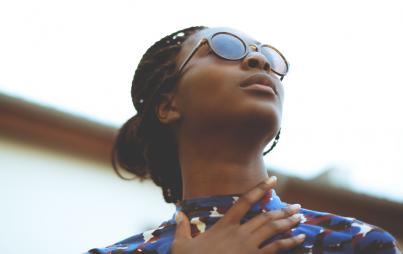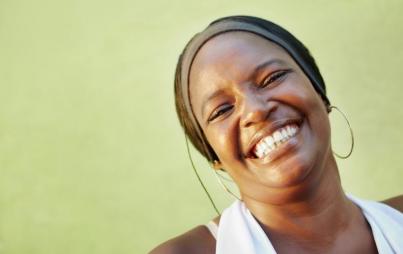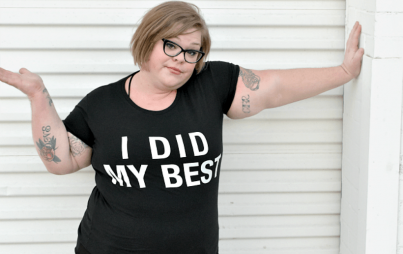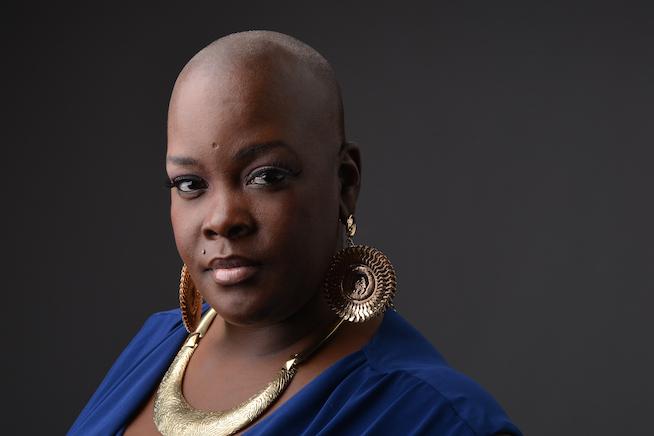
If you have not already visited the online home of The Body Is Not An Apology, a movement focused on radical self-love and recognizing the many ways we take up space in this world, I suggest you do so now. This is your one-stop online hub for body love, and nothing is off limits. I mean that. I just finished reading an article about learning to love your boob sweat, which is not a discussion I'd find in many other Internet spaces, even body positive ones. When Sonya Renee asserts that the body is not an apology, whether in her poem or her online community, she means it. I recently spoke with her about the history of TBINAA, how art informs activism, and the importance of sharing our "bad" selfies.
The Body Is Not An Apology started out as a Facebook post, correct?
Well actually, prior to that it started off as a poem. Which started out as a conversation with a friend. I was having a conversation with a friend with a disability, and she was fearful of having an unwanted pregnancy. And I was asking her about using condoms and having protected sex, and she was saying that she didn't feel entitled to ask this partner that she was sleeping with to use a condom because her disability already made it difficult for her to be sexual. And my response to her in the conversation was, "Your body is not an apology. It's not a thing that you offer to someone to say, sorry I have a disability."
When I said that to her, it just kept resonating inside of me, the words were still there. And so I was like "I think I'm going to write a poem" because my former career is as a performance poet. I was like "I'm going to write a poem." The words were asking for a poem, so I wrote the poem first, "The Body is Not an Apology." Then I made a Facebook post sharing a selfie of myself in a black corset that I had been sort of hiding away in my phone encouraging other people who felt unapologetic in their bodies to share photos where they felt empowered and beautiful.
The next day three or so folks tagged me in photos where they felt empowered and beautiful in their bodies, and I was like "Oh, I'll start a little Facebook page," and since I already have this poem called "The Body is Not an Apology," I'll name the Facebook page "The Body Is Not An Apology." That's how we got started.
I also wanted to ask you about your poetry. I've seen the poem. It's really great. How does poetry and performance influence your activism, or vice versa?
I think that poetry and performance were at least initially my access into activism. I think I started off doing much more advocacy work than activism work. I was much more in sort of direct service, and nonprofits, and that sort of thing. Poetry became how I processed epiphanies in the world. As I had revelations and discoveries and new understandings about humans, and how we relate and the systems that we interact with, I would write about them. For me, that was the way of emphasizing those things. I think that, in writing my experiences with humans and with issues of oppression and with the institutions and systems that we live in, as I began writing about those things and then sharing them, it sort of became its own activism.
Then as I began to share more around whatever issues I felt passionate about, often times I would then direct that passion into a poem. They just sort of played back and forth with each other. I'll have a realization, I'll write a poem, or I will be angry about a thing in the world, I'll write a poem, or I'll write a poem about it and then it becomes a thing that I then become more activated around.
It's always interesting how people talk about creative processes as though they're very abstract, when they actually end up enacting real, very tangible change in a lot of ways.
Yes, definitely. It feels like it's just sort of out, like this sort of superfluous thing out in the world, but it's been very, very interesting to watch ideas and concepts turn into brick and mortar, to turn into actual, physical, tangible change in the world.
The Body Is Not An Apology runs a lot of different features, but one of the most interactive and the fun ones is called "Bad Picture Mondays." We live in a world where, like, I literally posted a picture five minutes ago on Instagram. And I was very careful about how I posed and what filter I used, and made sure that the pimple that I had on my face was hidden. Why do you think we do that, and what is it about sharing bad pictures that you think can actually be empowering?
I think that we are conditioned to really believe that there are only certain ways in which our bodies can show up and be acceptable. That there is this idea of a bad body is the notion that we are challenging with Bad Picture Monday. The idea that there is some way that you can show up in the world where you don't deserve to be seen. We believe in a complete lie, complete fabrication of the truth. And so Bad Picture Monday is about embracing all of the ways in which we show up, and recognizing that there is no such thing as a bad picture because there's no bad way for us to be ourselves.
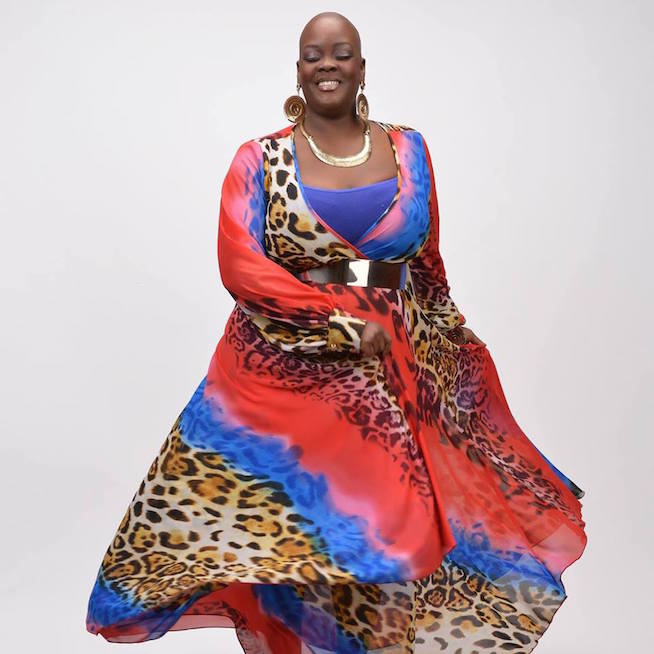
Bad Picture Monday recognizes that all the things we define as bad are completely socially constructed. Like that pimple that we're hiding, or that double chin that shows up in my photo, or that I feel like I look fat. All of those things are ways that society has told us our bodies should not be, but I totally believe the quote by activist Hanne Blank that says "There's no wrong way to have a body." If there is no wrong way to have a body then there is no bad picture that I can put up.
Then the other piece of that that I think is really, really important is that oppression operates from this face of invisibility. It makes certain people invisible and undervalued in our society. And so the way in which to challenge the politics of invisibility is to decide that no body is invisible. That every single body deserves to be seen and celebrated. And so Bad Picture Monday is about making sure that no bodies are invisible, and that every body gets to be seen and celebrated.
That's such a cool message. Your website approaches bodies from just about every aspect of experience. From age, to gender, to mental illness, sexuality –– how do you think an intersectional approach changes the way that we think about bodies and the way that we talk about them?
An intersectional lens reminds people that there isn't a default body. Because in our society, when I say the body positivity movement, unfortunately we have an image that shows up in our minds, and that image is often a thick white woman who is probably a size 12 and unhappy about it. That is the image that pops in our brains when we talk about body positivity. I'm interested in a body positivity that celebrates the Arab body, that celebrates the body with cerebral palsy, that celebrates the queer body, the trans body, and the bodies that inhabit multiple identities, that are both trans, and queer, and Arab, and, and, and, and. Because if we can figure out a way to make space for those bodies of all of those intersections to love and live unapologetically in the world, then we make space for anyone.
Right, because bodies in and of themselves are intersectional. I've never met a person who is any one thing.
Right, and you never will.
Your website runs a lot of stories, and I had never heard of this movement before until I read about it on your website, but now I think it's amazing. It's called Put an H on it. Can you explain the idea?
Totally. It is not mine at all. It is my good friend and also CFO of The Body is Not an Apology, Maureen Benson. She and some of her friends basically created this sort of game where whenever they did something powerful, or scary, or just badass in the world, they would call that, they would put an H on it, which means they handled it. Like I handled that situation. Then they began to start a silly tattoo game where they would get people to get H tattoos after they did something big and powerful in the world. A friend went into get cancer treatment and went into remission and got an H tattoo. Someone did something amazing and changed her life, they got an H tattoo. And so when we designed the website, we're like, "What would it look like to celebrate ways in which we just handle the everyday oppression that happen against our bodies? Just totally live our empowered, awesome lives?
I was like, "I think we should call it the Put an H on it." And so it was this awesome sort of movement that was out in the world like a month trend that then became this fantastic platform for us to celebrate because I think so often we end up in these stories about how bad the world is, and how hard it is to live in it, and how much stuff comes up against our attempts to live unapologetically and radically in our bodies. And what I really also want to highlight is that every single day people do amazing, powerful, phenomenal things to be unapologetically them. What does it look like to share those stories of empowerment? To remind us that, yes, the world is hard and that we innately have the ability to survive and thrive in it, and that we can light the path for other people looking to live unapologetic-ally in their bodies too? Put an H on it is our space where we get to capture those stories.
I always like to end these interviews with this question because this series is all about people we admire and we like to spread that around, so are there any radical body activists that you're loving right now, or voices of change that are inspiring you that you want to share with the world?
Oh, absolutely. There are so many. I feel so lucky to be surrounded by people just doing really radical, beautiful work. My best friend and rad body activist Denise Jolly and her beautiful projects just inspire me every day. Particularly as we see people really living. I think that as the body positivity movement sort of becomes more mainstream, there's a way in which the response becomes mainstream, but it also narrows, it's like, "OK, well now we let in people that are size 22," great. Right? But the question becomes how do we let in everybody? How do we decide that there is no wrong way to have a body, and that everybody deserves to celebrate their bodies? And I feel like her work absolutely does that.
I'm completely smitten with the women of the Black Lives Matter movement. These queer, black women who decided that the black lives matter and that it's all black lives. That it's queer black lives, and disabled black lives, and trans black lives, and that there is a way in which they are bringing an intersectional work to anti-racism and an intersectional lens to anti-racism work that is so powerful and galvanizing. I'm totally in love with them right now.
I'm totally in love with Ahmed. He's like taking over the planet right now. And he's an amazing example of again one that's intersection of identities. Like what does it mean to be an African-American born Arab child who's brilliant and smart and living under the aggression of racism? He's dealing with all of that right now, and totally putting an H on the situation.




